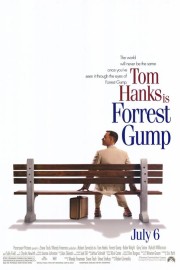Forrest Gump
I don’t know that I’ll ever have that personal itch to watch “Forrest Gump” again after this viewing. And honestly, I’m alright with that. Robert Zemeckis’s Best Picture winner has never been one that I’ve loved watching, although there have always been moments that I love in it. I’m not sure if I can say that now, and that’s part of why I don’t know if I’ll ever be inspired to watch it again.
The film is based on a novel by Winston Groom that is, for all intents and purposes, pretty drastically different from the movie. In the movie, we get to know the life of Forrest Gump (Tom Hanks), a man with a 75 IQ who is very fortunate in his life. When the film starts, he is sitting on a park bench in Savannah, Georgia, waiting for a bus. Someone sits next to him, and he begins to tell them his life, starting with his Mama (Sally Field), and taking us on a trip through his life that hits all the major flash points of the Baby Boomer generation. Elvis, the Civil Rights movement, Vietnam, presidents from Kennedy to Nixon, John Lennon, and more are a part of Forrest’s remarkable life, which intersects with that of Jenny (Robin Wright), whom he meets as a boy, and they continue to come into, and out of, each other’s lives as the years go on.
One of the biggest problems with “Forrest Gump,” ironically, is the title character. Hanks does a good job in the role which won him his second Oscar, but with Eric Roth’s screenplay turning him into a mentally-deficient leaf in the wind, the journey he goes on just doesn’t hold up because he doesn’t seem in control of his own destiny. That makes him a passive part of his own journey which is supposed to inspire us, and that’s the opposite of inspiring. It also calls into question the nature of Jenny’s loyalty to him over the years. Does she pity him? Does she use him? Does she genuinely care for him? Wright is lovely, but the character is kind of difficult to get a pin on. Her mother died when she was young, and her father was abusive. If we’re going to go with basic pop psychology, her tendencies towards promiscuity and drugs and being a free spirit come from that, but really, she is a conservative view of the flower generation next to Forrest being a conservative, love God and country heroic view of itself. That may seem harsh, but no harsher than Jenny being “punished” by getting AIDS and dying at the end, which is after she finally relents and marries Forrest, with the love child (played by Haley Joel Osment) they had together in tow. This is part of why the film focusing on the love story between them doesn’t work, at all, and why Jenny is someone whose loyalties to Forrest come into question.
The character that probably stood out strongest to me on this viewing was Lieutenant Dan, Forrest’s commanding officer in Vietnam played by the great Gary Sinise. If anyone’s story is inspiring in this film, it is Dan’s. The latest in a long line of soldiers- a member of his family has died in every, major American war- Dan seems like a very standard-issue army lieutenant when Forrest and Bubba (Forrest’s best friend, and someone who wants to be a shrimp boat captain like his family before him, played by Mykelti Williamson with warmth and humor) meet him, and he stays that way during the Vietnam scenes, up until when their company comes under attack, and Forrest saves him, against his wishes. They are at the VA hospital together, and Dan’s legs are amputated. He hates Forrest, and seeths at him for taking away his destiny of dying with his men. Gradually, as they meet up at other points in time, they become friends, and when Dan gets mad at a hooker on New Year’s Eve for calling Forrest stupid, we see his anger turning into empathy, which makes them going into business on a shrimp boat a bit less silly (though no less implausible). Dan’s rage for his situation dissipates, and eventually, he finds peace, which will result in a surprise near the end of the film when he shows up for Forrest and Jenny’s wedding. Dan is the closest thing to a fully-formed character arc in the film; he is playing something more than just a cliche, and where we meet him vs. where we last see him is, seriously, the most inspiring part of the film.
Zemeckis and Roth lean heavily on Baby Boomer nostalgia to tell this story, and the rock soundtrack is an epic exploration of musical history in the 30 years the film covers, with Alan Silvestri adding much in the impact of Forrest and Jenny’s story. While the songs are well-chosen, they also are as predictable as Silvestri’s score is, and while I still like both, they don’t have the lingering strength to elevate the film beyond the cliches that keep it from being truly great. More impressive in a lasting way are the images they bring to the screen, with great production design (although Vietnam looks pretty artificial), shot with a painter’s eye by Don Burgess, and utilizing terrific visual effects to put Forrest into history, and taking Lieutenant Dan’s legs away in a plausible way. That my biggest praise for Zemeckis’s film lies in his technical skills, and a supporting character in Forrest’s story, says a lot about what stands out about the film now for me. The rest feels as empty as the platitudes Forrest speaks in when he’s telling his story.










